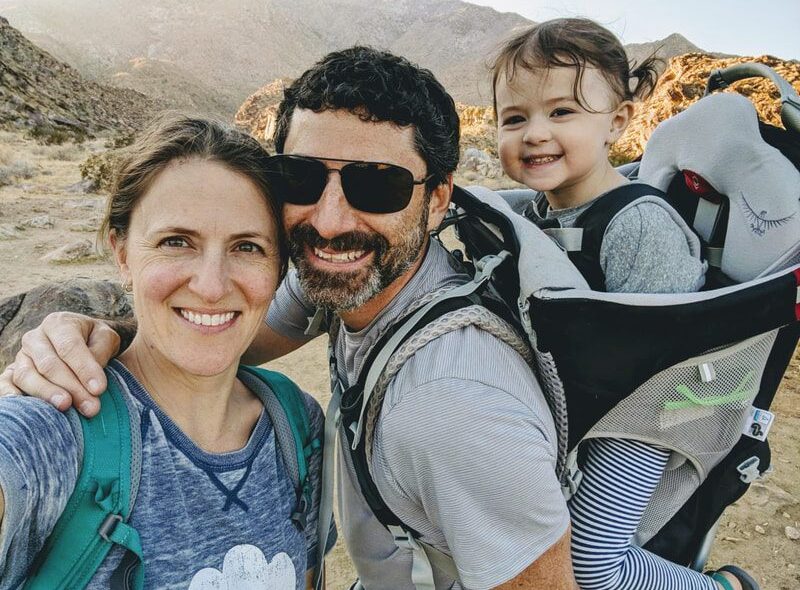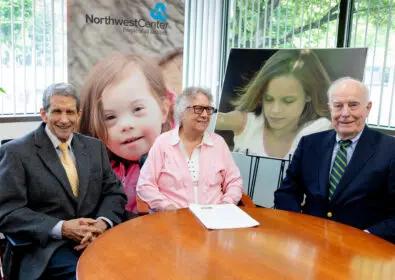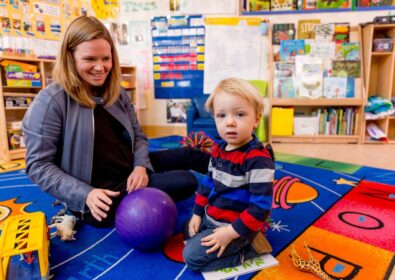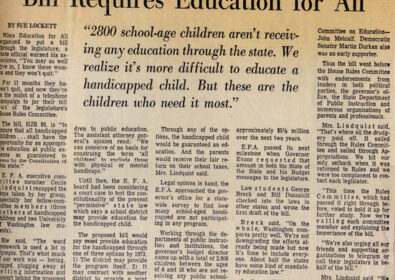n
n
At just four months old, Noemie was having trouble getting enough nutrition. Her diagnosis was complex: tongue-tie (ankyloglossia), a condition that restricts the tongue’s range of motion; acid reflux; food allergies; and sensory processing disorder.
oemie’s pediatrician referred her to a special clinic for children who have trouble getting enough nutrition. As the months passed, she saw other specialists in gastroenterology and nutrition, and began outpatient feeding therapy. And yet, Noemie made little progress.
Finally, the pediatrician referred Noemie’s family to Northwest Center Early Supports for Infants and Toddlers’ (ESIT) feeding therapy program, and they began working with occupational therapist Molly Nolan-Jones. The in-home visits were valuable, but after a few months, Nolan-Jones felt that Noemie’s diagnosis was not complete.
“At that point, Molly told us what turned out to be some of the most important words: ‘I feel like something else is wrong; you need to take her back to the gastroenterologist,” says Noemie’s mom Nichole.
“Molly became more than a feeding therapist,” Nichole continues. “She became a family advocate. She spoke with doctors on our family’s behalf, and she was instrumental in helping the doctors find a proper diagnosis: eosinophilic gastrointestinal disease.”
Eosinophilic gastrointestinal disease (EGID) makes it painful and difficult to swallow and digest food. Because Noemie’s EGID diagnosis was delayed, she had developed a pediatric feeding disorder. So Nolan-Jones continued to work with the family.
“I provided education about how to present food, how to engage in sensory play throughout her day, sensory approaches to food, and mealtime routines at their home,” says Nolan-Jones.
When Noemie turned 2, Early Supports transitioned her occupational therapy services from her home to the Early Learning classrooms at Northwest Center Kids at Greenwood.
“Noemie, her mom, and I would join the classroom at lunchtime,” says Nolan-Jones. “Our goal was for Noemie to spend time around other kids who were eating and enjoying food. This was motivating for Noemie, and she would eat more food during these meals.”
This past fall, Noemie officially transitioned to Early Learning as a student.
“Words can’t even explain how thankful I am to Molly and everyone at Northwest Center,” Nichole says. “It made a big difference in Noemie’s life and saved her from further complications. I couldn’t be more grateful.”
Learn about EGID at Apfed (American Partnership for Eosinophilic Disorders). Visit Northwest Center Early Supports for Infants and Toddlers to learn more about services for children from birth to age 3.
oemie’s pediatrician referred her to a special clinic for children who have trouble getting enough nutrition. As the months passed, she saw other specialists in gastroenterology and nutrition, and began outpatient feeding therapy. And yet, Noemie made little progress.
Finally, the pediatrician referred Noemie’s family to Northwest Center Early Supports for Infants and Toddlers’ (ESIT) feeding therapy program, and they began working with occupational therapist Molly Nolan-Jones. The in-home visits were valuable, but after a few months, Nolan-Jones felt that Noemie’s diagnosis was not complete.
“At that point, Molly told us what turned out to be some of the most important words: ‘I feel like something else is wrong; you need to take her back to the gastroenterologist,” says Noemie’s mom Nichole.
“Molly became more than a feeding therapist,” Nichole continues. “She became a family advocate. She spoke with doctors on our family’s behalf, and she was instrumental in helping the doctors find a proper diagnosis: eosinophilic gastrointestinal disease.”
Eosinophilic gastrointestinal disease (EGID) makes it painful and difficult to swallow and digest food. Because Noemie’s EGID diagnosis was delayed, she had developed a pediatric feeding disorder. So Nolan-Jones continued to work with the family.
“I provided education about how to present food, how to engage in sensory play throughout her day, sensory approaches to food, and mealtime routines at their home,” says Nolan-Jones.
When Noemie turned 2, Early Supports transitioned her occupational therapy services from her home to the Early Learning classrooms at Northwest Center Kids at Greenwood.
“Noemie, her mom, and I would join the classroom at lunchtime,” says Nolan-Jones. “Our goal was for Noemie to spend time around other kids who were eating and enjoying food. This was motivating for Noemie, and she would eat more food during these meals.”
This past fall, Noemie officially transitioned to Early Learning as a student.
“Words can’t even explain how thankful I am to Molly and everyone at Northwest Center,” Nichole says. “It made a big difference in Noemie’s life and saved her from further complications. I couldn’t be more grateful.”
Learn about EGID at Apfed (American Partnership for Eosinophilic Disorders). Visit Northwest Center Early Supports for Infants and Toddlers to learn more about services for children from birth to age 3.





